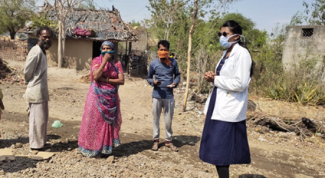As a child, Chetna Sharma dreamed of joining the Indian Army. Although that dream didn’t come true, Sharma is still serving her country. As a Community Health Officer (CHO) at a Health and Wellness Centers (HWC) in rural Madhya Pradesh, today she is doing all that she can to prevent and control the COVID-19 pandemic.
With the support of village-level stakeholders and a simple microphone, Sharma and other community health workers are raising awareness and educating community members in the six villages that her HWC serves about the measures they can take to prevent COVID-19. Every day, she targets one village and using her microphone, she broadcasts messages about hand and respiratory hygiene and social distancing. The microphone is loud enough that villagers do not need to leave their houses to get accurate and timely information on COVID-19.
Sharma has strategically engaged local leaders, who are sharing public health messages in their villages, and the police, who have agreed to play daily pre-recorded messages from their vans. By involving these stakeholders, she believes the communities will take the preventive measures more seriously and there will be a better compliance. “These are all my people from my community and it’s my duty as a health worker to ensure their good health and also ensure that they do not become victims of this new virus,” says Chetna proudly.
USAID’s health system strengthening NISHTHA project, implemented by Jhpiego, is helping health workers like Sharma across the country by building their knowledge and skill sets to deal with the pandemic. Sharma is one of 1,580 CHOs in Madhya Pradesh who NISHTHA staff trained on topics that include strategic messaging, counselling, screening, and basic clinical management of COVID-19. India’s nationwide lockdown made in-person training impossible, so NISHTHA used virtual platforms to conduct the training. According to Sharma,“the training provided information in a structured way. I was able to learn the myths and facts, which are very useful when I visit the communities.”
Sharma uses what she learned in the training when she does her daily visits to the villages and when she visits the homes of people who have been quarantined. Social media has made it easy for rumors and mis-information to circulate and Sharma is glad that she can educate people with accurate information. She says it is gratifying to “see other community members now educating their neighbors and asking them to stay home.”
With cases rising steadily, it is important to contain them as early as possible. Sharma has added to her duties and now diligently conducts home visits when new people enter one of the villages she oversees to collect travel histories and also follow up with those who have been quarantined at home.
Sharma is a new CHO and only recently arrived at her post in Madhya Pradesh. Although it can sometimes be difficult to remain motivated, particularly because she is far from her family support system, Sharma tries to remain positive and committed to serving her new community and her country. “I am very lucky to have this opportunity to work on a global pandemic at the start of my career. I am sure that this will help me deal with any challenge in the future and help my people,” says Sharma, ready to address this pandemic head-on.

Photo: NISHTHA
